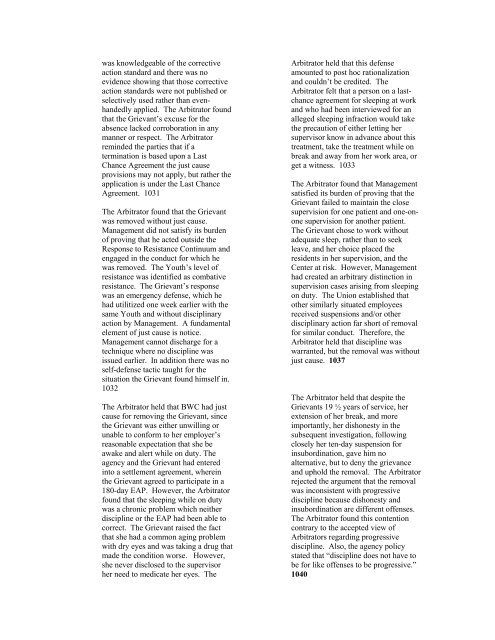by Contract Number (PDF) - OCSEA
by Contract Number (PDF) - OCSEA
by Contract Number (PDF) - OCSEA
Create successful ePaper yourself
Turn your PDF publications into a flip-book with our unique Google optimized e-Paper software.
was knowledgeable of the corrective<br />
action standard and there was no<br />
evidence showing that those corrective<br />
action standards were not published or<br />
selectively used rather than evenhandedly<br />
applied. The Arbitrator found<br />
that the Grievant’s excuse for the<br />
absence lacked corroboration in any<br />
manner or respect. The Arbitrator<br />
reminded the parties that if a<br />
termination is based upon a Last<br />
Chance Agreement the just cause<br />
provisions may not apply, but rather the<br />
application is under the Last Chance<br />
Agreement. 1031<br />
The Arbitrator found that the Grievant<br />
was removed without just cause.<br />
Management did not satisfy its burden<br />
of proving that he acted outside the<br />
Response to Resistance Continuum and<br />
engaged in the conduct for which he<br />
was removed. The Youth’s level of<br />
resistance was identified as combative<br />
resistance. The Grievant’s response<br />
was an emergency defense, which he<br />
had utilitized one week earlier with the<br />
same Youth and without disciplinary<br />
action <strong>by</strong> Management. A fundamental<br />
element of just cause is notice.<br />
Management cannot discharge for a<br />
technique where no discipline was<br />
issued earlier. In addition there was no<br />
self-defense tactic taught for the<br />
situation the Grievant found himself in.<br />
1032<br />
The Arbitrator held that BWC had just<br />
cause for removing the Grievant, since<br />
the Grievant was either unwilling or<br />
unable to conform to her employer’s<br />
reasonable expectation that she be<br />
awake and alert while on duty. The<br />
agency and the Grievant had entered<br />
into a settlement agreement, wherein<br />
the Grievant agreed to participate in a<br />
180-day EAP. However, the Arbitrator<br />
found that the sleeping while on duty<br />
was a chronic problem which neither<br />
discipline or the EAP had been able to<br />
correct. The Grievant raised the fact<br />
that she had a common aging problem<br />
with dry eyes and was taking a drug that<br />
made the condition worse. However,<br />
she never disclosed to the supervisor<br />
her need to medicate her eyes. The<br />
Arbitrator held that this defense<br />
amounted to post hoc rationalization<br />
and couldn’t be credited. The<br />
Arbitrator felt that a person on a lastchance<br />
agreement for sleeping at work<br />
and who had been interviewed for an<br />
alleged sleeping infraction would take<br />
the precaution of either letting her<br />
supervisor know in advance about this<br />
treatment, take the treatment while on<br />
break and away from her work area, or<br />
get a witness. 1033<br />
The Arbitrator found that Management<br />
satisfied its burden of proving that the<br />
Grievant failed to maintain the close<br />
supervision for one patient and one-onone<br />
supervision for another patient.<br />
The Grievant chose to work without<br />
adequate sleep, rather than to seek<br />
leave, and her choice placed the<br />
residents in her supervision, and the<br />
Center at risk. However, Management<br />
had created an arbitrary distinction in<br />
supervision cases arising from sleeping<br />
on duty. The Union established that<br />
other similarly situated employees<br />
received suspensions and/or other<br />
disciplinary action far short of removal<br />
for similar conduct. Therefore, the<br />
Arbitrator held that discipline was<br />
warranted, but the removal was without<br />
just cause. 1037<br />
The Arbitrator held that despite the<br />
Grievants 19 ½ years of service, her<br />
extension of her break, and more<br />
importantly, her dishonesty in the<br />
subsequent investigation, following<br />
closely her ten-day suspension for<br />
insubordination, gave him no<br />
alternative, but to deny the grievance<br />
and uphold the removal. The Arbitrator<br />
rejected the argument that the removal<br />
was inconsistent with progressive<br />
discipline because dishonesty and<br />
insubordination are different offenses.<br />
The Arbitrator found this contention<br />
contrary to the accepted view of<br />
Arbitrators regarding progressive<br />
discipline. Also, the agency policy<br />
stated that “discipline does not have to<br />
be for like offenses to be progressive.”<br />
1040
















